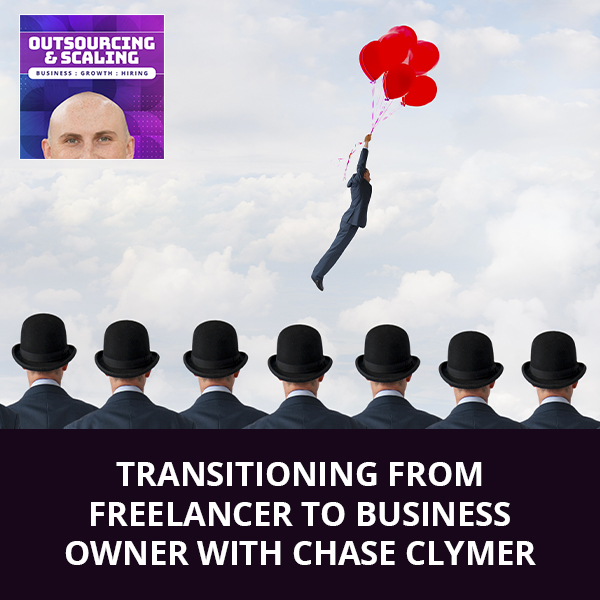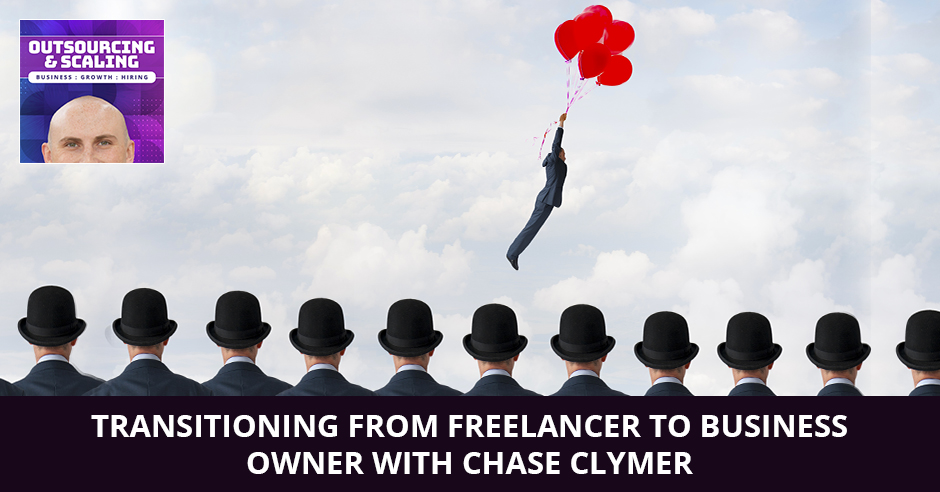


When you have two freelancers, one handling web dev and the other doing Facebook ads, you got the perfect formula for an eCommerce business. In this episode, Shopify expert Chase Clymer talks about his transition from being a solo freelancer to being a business owner. Chase shares his expert tips on how to start and own customer relationship with Shopify and reveals his method for hiring quality team members. He also talks about how and why he decided to run his company 100% remote. The world of eCommerce is getting more and more exciting. Don’t miss this episode to learn how this could be a great opportunity for you.
—
Listen to the podcast here:
[smart_track_player url=”https://www.podetize.com/statsapi/www.podetize.com/wp-content/uploads/fileuploads/11-5b145ef137b51b3d1af0633e9305c43d/10/2019/f627afc9438eb861748446e5a777e78e.mp3″ title=”Transitioning From Freelancer To Business Owner with Chase Clymer” artist=”Nathan Hirsch” image=”https://freeup.net/wp-content/uploads/2019/04/OAS.png” ]
Download the audio file here.
Transitioning From Freelancer To Business Owner with Chase Clymer
My guest is Chase Clymer. Chase, how are you doing?
I’m doing fantastic.
Chase is a Shopify expert, making eCommerce brands more money every day. He runs Electric Eye, a Shopify only agency and host Honest Ecommerce, a weekly podcast that gives store owner’s honest actual advice. He was telling me he puts in 30-days’ notice in his office and he is going a 100% remote.
We’re doing that. They said normally they need 30-days’ notice, but if we’re out by the end of the month, our lease is up and we have been month-to-month for a while. Aside on that, I 100% think at the beginning of your business if you have partners or key players, actually having an office was 100% needed. It helped us get a lot of stuff into place, but we don’t need anymore.
How many people do you have?
We got three on the main team, then we have a small stable of designers, developers, producers and marketers. We are usually floating between seven and fourteen with contractors, but we’re moving towards a more stable group. It’s the growing pains of making a remote business.
What are their thoughts, the people that were in the office? Are they happy about going remote? What changes are they expecting?
We have a weekly standup. We run on the traction model, which I highly recommend, the EOS. We had our standup and we’re all dancing the idea of going remote, of getting rid of our office and someone was like, “At the end of the day, this is how much money we would like to have left over and at the end of the year we would be putting at our pocket.” That is an expense that we don’t need. None of our clients are in Columbus, Ohio so it doesn’t matter. “Let’s get rid of this thing.” We deveining up the furniture and got way off track, “I want that poster.”
Having an office is an expense you don’t need. Consider going remote.
Are you worried all about the culture? That was honestly one of the biggest miss. I had an office back in the day and I thought that bringing everyone together would lead to a better culture. I found that my remote culture for whatever reason, my management style is better remote than it is in person. What are your thoughts on that?
We’ll be fine. We’re all here in Columbus still. The core team leads, but we talk on Zoom all the time, it’s voice calls. It’s not emails, it’s not texts, not base camp comments. We are definitely talking a lot more. The culture is still there. We are still in the morning every day. Once you started getting things together, sharing some memes or whatever is the going on are. Anytime there is a big metal concert in Columbus, we all go do it.
Let’s take a step back. Let’s go all the way back. Growing up, were you a straight-A student? Were you a rebel? Did you always know you wanted to be an entrepreneur?
You can say I was always smart. School came easy to me. I just got stuff. I never studied. I got suspended a few times and almost got expelled. Your typical little troublemaker. I was getting suspended in junior year of high school because I was being late to school every day. My first class was on computers which I aced. I was done for the rest of the year by week one. It was the easiest class in the world. I was never coming to school on time. If you have three late, you get Wednesday school. I wasn’t going to those. Finally, they pulled me in the office one day and said, “We’re going to suspend you because you’re not doing all these things. In the real world, are you not going to show up? What happens when you go to college?” I was like, “When I go to college, I can choose what time my classes start.” They’re like, “You got us there. How about you graduate early? Take these three classes and get out.” I graduated early. I went to college. I graduated in six months. I had taken a year of school and I got half of an associate’s. During that time, I was playing music and I dropped out of college to join a band and I did that for a couple of years. That was fun.
How did you get into eCommerce? Tell us the story.
The band did not pay the bills. I was terrible at music, no I’m just kidding. The band was great and the band was fun. I learned a lot of stuff from that. We weren’t paying the bills. I was learning marketing. I started with photography, got into design, web development and a little bit into marketing. I was doing all of these skills for hire. I was a freelancer. I was finding things I could while on the road, trying to support what I love doing and supplementing it with these skills I had picked. As the band was fading out and the real world was fading back in, I had all these skills I had acquired. I was freelancing full-time from eighteen on.
What made you get into an agency eventually? What made you scale that part of the business?
I never had the idea to do an agency. Me and my business partner, Shawn kicked it around as a joke, but we never wanted to do it. He left his business a few years back. He was there for quite a while and he left. He was taking on some freelance projects and doing them all the wrong way, working without contracts. It’s everything on this that you can be wrong and he was doing it. I was giving him a bunch of advice on how to be better at that and then we tag-team all these Shopify projects together. He was doing the design dev on it and marketing. He summed this up from his network and then I was coming in. I was marketing these things through Facebook ads. That was back in the heyday of Facebook ads where you could literally put a dollar behind anything and make two.

We were tag-teaming all these things and we thought about it and we were, “Should we make a Facebook ad for Shopify agency? We were like no.” Three months later we had an agency because that’s how those things work. We have all these clients that we were working with. We had four or five. It was managing Facebook advertising for Shopify stores that got us off the ground. We had no idea what we were doing and then we went to Shopify Unite, which is their partner conference and that was in San Francisco. We went out to that and met all these actual agencies. We got a bunch of awesome advice and met some people there that we still talk to these days.
This ecosystem that we’re in with eCommerce and Shopify, it’s fun. We came back from that and we’re energized about the business and about doing things the right way because at that point we had no idea what we were doing. We were glorified freelancers that had a cool name. We got back from that. After the first year, it was stagnant and we had no clue what was going on. After that, I was heads down to books, reading all I could and asking for advice. If you’re ever the smartest person in the room, that’s all that. It was right, we never thought we knew anything. We would always ask people for their second opinion. There are many books out there that can help you on your journey going from freelancer to a consultant to business owner. It’s that trajectory. We did that for a year and a half to two years. We’re still working on systems and processes. Where we are and where we were a couple of years ago are so different. It’s almost the amount of processes that we put into place and the amount of policy and delegation. Those things are boring but they are important.
Talk to me about building that team. You mentioned that you have your internal team, your core guys, then you have these, I call it the Rolodex of people that you can go to. That’s how I encourage agencies to scale as well and you can eventually take that Rolodex and add people to your team, depending on how it goes and stuff. Talk to us about the process of building that up and what you’ve learned.
We definitely met a ton of people at Unite when we were there. We met a bunch of people there and met a team that we could afford at choosing how these things start. They were offshore and we were using them for quite a long time. As we were growing as business and as they were growing as a business, we weren’t as aligned as we were when we began, so we started looking elsewhere. At another Shopify event, we met another team this time in our time zone and definitely more aligned to that point. With that being said, I’ve also got a VA across the world. We got a team of writers. I’ve got a lot of people that are baked into place for some certain tasks within the business.
The number one thing I found about hiring is it doesn’t matter what their resume says. It matters how good they are at doing what you ask and that goes back to how good you are at explaining what you want. We make sure they can answer the description of the job post correctly, that’s probably number one. Number two, we hire four or five people we think that looks right and give them all a test job. That’s the easiest way to figure out if the quality is going to be there and if they’ll follow the guidelines you set forth on whatever the project is. There are many out there and all the good ones are taken. You have to play the field until you find some quality team members that hopefully, you can work with quite a while.
That’s exactly why we build the FreeeUp platform to get people access to faster and faster talent. Let’s talk about Shopify a little bit. Talk about some of your biggest clients. What are they doing that’s allowing them to have such success that maybe smaller people or people that are scaling or growing are not doing?
They’re 100% invested in brand. That’s a generic statement, but the brand is important and everything from the style behind the photos on your website to your logo, to your presentation of your packaging when you receive your package. It’s all an investment in long-term growth of the business and long-term growth of awareness of the brand. Where I see why people are failing is, they still think you can make money off Facebook ads. They still think that you can spin up a store on Shopify with a terrible fiber logo and some fiber direct to consumer, drop shipping apparel and make a dollar. Those days are gone. I hated when those days are real. That’s not proper, that’s a money grab. It takes hard work to make real money. That’s the wrong way to approach business in general. I applaud that our clients are taking the time to invest in brand first and foremost.
If your business survives on paid acquisition, that’s a bad strategy to go with.
How do you see Shopify changing over the years?
With paid advertising getting more expensive, any of these brands that were betting the bank on paid acquisition, they are not going to be able to survive that way. You’ve got to branch out in other channels, your social, email, all of that stuff. I feel where Shopify is going to come in to play is going to be facilitating some better integrations with other channels. You have seen that with how they’re building out their integrations through their partnership and app partnership marketplaces. Shopify is good with what they do. They’re core offering, which is selling a good from the store to the customer but beyond that they don’t want to tackle it. They’ve got a robust ecosystem that will tackle all of those individual problems for them and that’s what helped them a bit with their growth.
What other tips do you have for Shopify entrepreneurs?
It’s building an email list from day one. Email is king. Some of our bigger clients, 25% to 30% of the revenues are derived from email. The other big chunk is direct paid acquisition. If your business survives on paid acquisition, that channel’s algorithm could change and you’d be out of business. That’s a bad strategy to go with. If you’re starting out in eCommerce, you don’t need a custom website design, tip to tail all you. You need a tried and true theme, you need to focus on your product and your product market. That’s way more important at that stage.
I guess my last question is why Shopify oppose to other channels. Amazon, eBay, that’s where the customers are. If someone’s thinking about going on Shopify and they’re having so much success on Amazon, what would you tell them?
You can either own your customer or the platform you’re on, the marketplace can own the customer. It’s how you want to run your business model. If you’re trying to find product-market fit, testing it in a marketplace is going to be a way faster success rate. I would say if you do that, find your product-market fit, you’ll find products you want and pull in front of that marketplace, double down on building the brand yourself and owning that customer relationship. It’s going to give you a higher lifetime value, higher returns on everything that you put into it, but it’s going to be a longer road. People will need to understand that.
Going back to why Shopify and why not anything else. If we’re talking just eCommerce platforms that aren’t marketplaces, Magento. I have heard a lot of horror stories about it being a non-managed solution. You’ve got to have a developer on staff and a lot of tactical knowledge to use that platform. Squarespace, eCommerce was an afterthought, Shopify is not. Squarespace serves its purpose your brochure-type websites and your informational websites. It’s like a managed version of a WordPress site. WordPress is a non-managed and non-eCommerce first solution. You’re hacking together a solution to make it work on WordPress there. If you’re selling an actual product and you wanted to have ease of use, you want to focus on marketing, focus on growing your business and not have a headache with your solution, Shopify is your number one bet.
Chase, thank you so much for joining us. Where can people find out more about you and what are you most excited about for the rest of the year?

If you want to find more about me, you can check me out on Twitter, it’s @ChaseClymer. I’m the host of Honesty Ecommerce, a podcast that I had him on. You can go find his episode and listen to me interviewing him. It’s weird to be on the other side of the mic. You can find that at Honest Ecommerce, type that in the old Google or you can go to my agency’s website, ElectricEye.io.
Thanks, Chase.
Thank you.
Important Links:
- Electric Eye
- Honest Ecommerce
- @ChaseClymer – Twitter
- Episode – Honest Ecommerce episode with Nathan Hirsch
- ElectricEye.io
About Chase Clymer
 Chase Clymer is a Shopify Expert making eCommerce brands more money every day. He runs Electric Eye, a Shopify only agency, and hosts Honest Ecommerce, a weekly podcast that gives store owners honest, actionable advice.
Chase Clymer is a Shopify Expert making eCommerce brands more money every day. He runs Electric Eye, a Shopify only agency, and hosts Honest Ecommerce, a weekly podcast that gives store owners honest, actionable advice.
